关系副词引导的定语从句复习过程
高三英语语法复习系列讲解----关系副词引导的定语从句
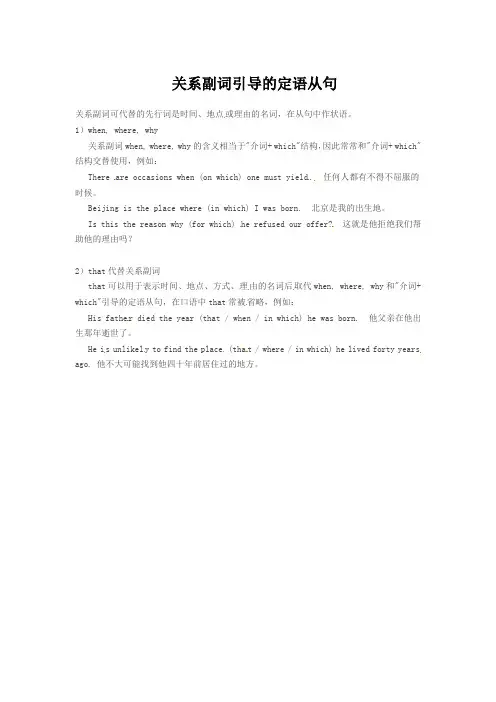
关系副词引导的定语从句
关系副词可代替的先行词是时间、地点或理由的名词,在从句中作状语。
1)when, where, why
关系副词when, where, why的含义相当于"介词+ which"结构,因此常常和"介词+ which"结构交替使用,例如:
There are occasions when (on which) one must yield. 任何人都有不得不屈服的时候。
Beijing is the place where (in which) I was born. 北京是我的出生地。
Is this the reason why (for which) he refused our offer?这就是他拒绝我们帮助他的理由吗?
2)that代替关系副词
that可以用于表示时间、地点、方式、理由的名词后取代when, where, why和"介词+ which"引导的定语从句,在口语中that常被省略,例如:
His fathe r died the year (that / when / in which) he was born. 他父亲在他出生那年逝世了。
He i s unlikel y to find the place (tha t / where / in which) he lived forty years ago. 他不大可能找到他四十年前居住过的地方。
定语从句中关系副词的用法及解题技巧
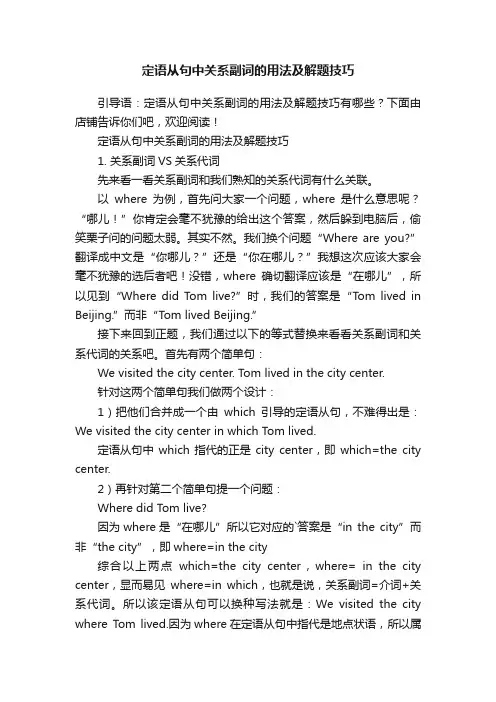
定语从句中关系副词的用法及解题技巧引导语:定语从句中关系副词的用法及解题技巧有哪些?下面由店铺告诉你们吧,欢迎阅读!定语从句中关系副词的用法及解题技巧1. 关系副词VS关系代词先来看一看关系副词和我们熟知的关系代词有什么关联。
以where为例,首先问大家一个问题,where是什么意思呢?“哪儿!”你肯定会毫不犹豫的给出这个答案,然后躲到电脑后,偷笑栗子问的问题太弱。
其实不然。
我们换个问题“Where are you?”翻译成中文是“你哪儿?”还是“你在哪儿?”我想这次应该大家会毫不犹豫的选后者吧!没错,where确切翻译应该是“在哪儿”,所以见到“Where did Tom live?”时,我们的答案是“T om lived in Beijing.”而非“Tom lived Beijing.”接下来回到正题,我们通过以下的等式替换来看看关系副词和关系代词的关系吧。
首先有两个简单句:We visited the city center. Tom lived in the city center.针对这两个简单句我们做两个设计:1)把他们合并成一个由which引导的定语从句,不难得出是:We visited the city center in which Tom lived.定语从句中which指代的正是city center,即which=the city center.2)再针对第二个简单句提一个问题:Where did Tom live?因为where是“在哪儿”所以它对应的`答案是“in the city”而非“the city”,即where=in the city综合以上两点which=the city center,where= in the city center,显而易见where=in which,也就是说,关系副词=介词+关系代词。
所以该定语从句可以换种写法就是:We visited the city where Tom lived.因为where在定语从句中指代是地点状语,所以属于关系副词。
定语从句(3)关系副词引导的定语从句
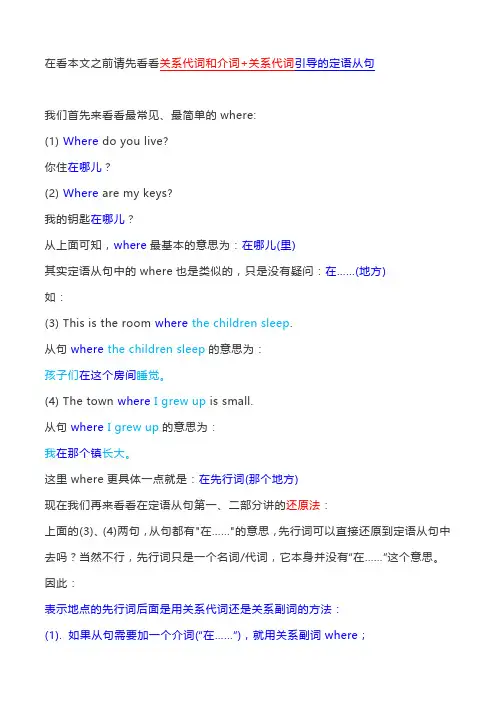
在看本文之前请先看看关系代词和介词+关系代词引导的定语从句我们首先来看看最常见、最简单的where:(1) Where do you live?你住在哪儿?(2) Where are my keys?我的钥匙在哪儿?从上面可知,where最基本的意思为:在哪儿(里)其实定语从句中的where也是类似的,只是没有疑问:在……(地方)如:(3) This is the room where the children sleep.从句where the children sleep的意思为:孩子们在这个房间睡觉。
(4) The town where I grew up is small.从句where I grew up的意思为:我在那个镇长大。
这里where更具体一点就是:在先行词(那个地方)现在我们再来看看在定语从句第一、二部分讲的还原法:上面的(3)、(4)两句,从句都有"在……"的意思,先行词可以直接还原到定语从句中去吗?当然不行,先行词只是一个名词/代词,它本身并没有“在……”这个意思。
因此:表示地点的先行词后面是用关系代词还是关系副词的方法:(1). 如果从句需要加一个介词(“在……”),就用关系副词where;(2). 如果从句不缺介词(“在……”),就用关系代词:第一种情况:已经有了介词“在……”第二种情况:不需要介词“在……”(直接作主语、宾语、表语或表示所属关系) 例如:例3的先行词还原到从句变为:The children sleep the room.这个句子the room前面需要加上介词(in)才对。
所以用关系副词where。
如果这个句子改动一下变为:(5) This is the room _______ the children sleep in.这个句子的定语从句部分已经有介词in,先行词可以直接还原(作介词宾语):The children sleep in the room.因此,此题用关系代词that/which或省略。
定语从句关系副词的详细讲解及练习
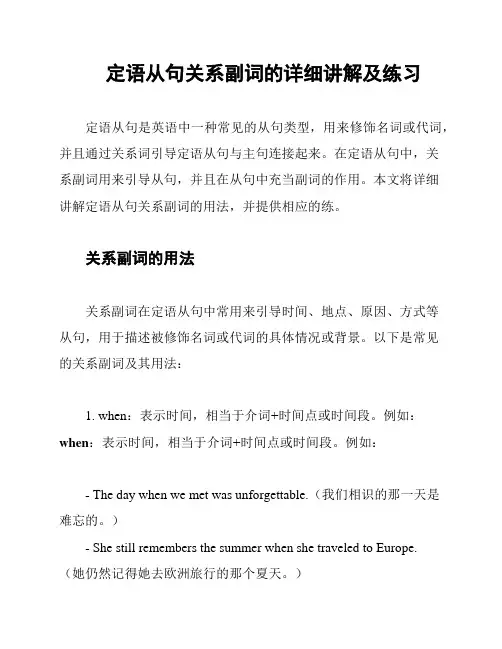
定语从句关系副词的详细讲解及练习定语从句是英语中一种常见的从句类型,用来修饰名词或代词,并且通过关系词引导定语从句与主句连接起来。
在定语从句中,关系副词用来引导从句,并且在从句中充当副词的作用。
本文将详细讲解定语从句关系副词的用法,并提供相应的练。
关系副词的用法关系副词在定语从句中常用来引导时间、地点、原因、方式等从句,用于描述被修饰名词或代词的具体情况或背景。
以下是常见的关系副词及其用法:1. when:表示时间,相当于介词+时间点或时间段。
例如:when:表示时间,相当于介词+时间点或时间段。
例如:- The day when we met was unforgettable.(我们相识的那一天是难忘的。
)- She still remembers the summer when she traveled to Europe.(她仍然记得她去欧洲旅行的那个夏天。
)2. where:表示地点,相当于介词+地点。
例如:where:表示地点,相当于介词+地点。
例如:- This is the house where I used to live.(这是我曾经住过的房子。
)- I love the city where I was born.(我爱我出生的那座城市。
)3. why:表示原因,相当于介词+原因。
例如:why:表示原因,相当于介词+原因。
例如:- That's the reason why she quit her job.(那就是她辞职的原因。
)4. how:表示方式,相当于介词+方式。
例如:how:表示方式,相当于介词+方式。
例如:- She showed me how to solve the math problem.(她告诉我如何解决这个数学问题。
)- I can't believe how fast he ran.(我无法相信他跑得有多快。
)练请用适当的关系副词完成以下句子,并确保定语从句与主句的关系恰当。
定语从句(3)

第二部分 专题九
第2页
高考一轮总复习 ·英语
学习目标
理解定语从句,先行词,关系词
第
1 学会选择关系词
步
学习重点
第
3
掌握如何正确选择关系词
步
第
2 学习难点
步
判断关系词在从句中做什么成分
介词+关系代词的用法
第二部分 专题九
第3页
高考一轮总复习 ·英语
展示任务
1. 定语从句的相关概念(定语从句 先行词 关系词 )
第
1 2. 什么情况下只能用关系词that? 什么情况下只能用which?
步
3. “介词+关系代词”引导的定语从句中,怎么选择介词和 第
关系代词
3 步
第 4. Which 和 as 引导定语从句的区别
2
步 5. 以 way 和 time 为先行词的定语从句。
6. 高考应用与策略
7. 高考演练
8. 课堂小结
第二部分 专题九
第17页
高考一轮总复习 ·英语
第
1 步
考点三 “介词+关系代词”引导的定语从句
1.若介词放在关系代词之前,关系代词指人时常用 whom,第
3
指物时常用 which。另外,whose 也可以放在介词后,即“介 步
第 2
词+whose+名词”结构。
步
第二部分 专题九
第18页
高考一轮总复习 ·英语
步
第 2
2.当定语从句中缺少主语或宾语时,即使先行词是表示时
步
间、地点和原因的词仍用 which/that 引导定语从句。
第二部分 专题九
第14页
高考一轮总复习 ·英语
高考英语复习之定语从句关系副词的用法讲义
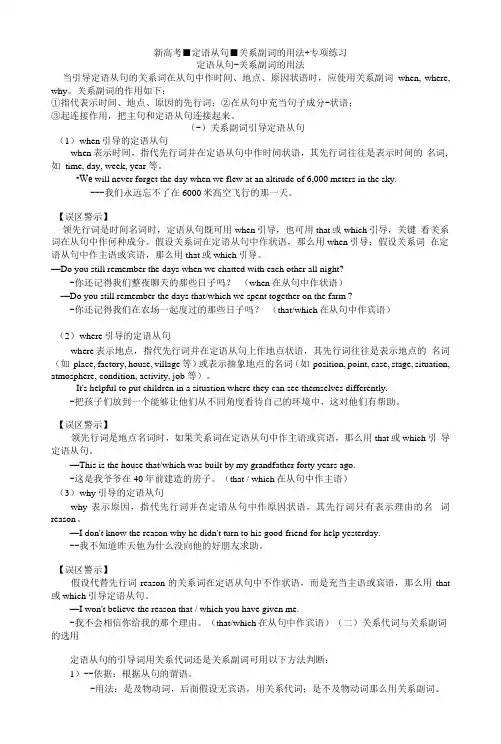
新高考■定语从句■关系副词的用法+专项练习定语从句-关系副词的用法当引导定语从句的关系词在从句中作时间、地点、原因状语时,应使用关系副词when, where, why。
关系副词的作用如下:①指代表示时间、地点、原因的先行词;②在从句中充当句子成分-状语;③起连接作用,把主句和定语从句连接起来。
(-)关系副词引导定语从句(1)w hen引导的定语从句when表示时间,指代先行词并在定语从句中作时间状语,其先行词往往是表示时间的名词,如time, day, week, year 等。
•We will never forget the day when we flew at an altitude of 6,000 meters in the sky.---我们永远忘不了在6000米高空飞行的那一天。
【误区警示】领先行词是时间名词时,定语从句既可用when引导,也可用that或which引导,关键看关系词在从句中作何种成分。
假设关系词在定语从句中作状语,那么用when引导;假设关系词在定语从句中作主语或宾语,那么用that或which引导。
—Do you still remember the days when we chatted with each other all night?-你还记得我们整夜聊天的那些日子吗?(when在从句中作状语)—Do you still remember the days that/which we spent together on the farm ?-你还记得我们在农场一起度过的那些日子吗?(that/which在从句中作宾语)(2)w here引导的定语从句where表示地点,指代先行词并在定语从句上作地点状语,其先行词往往是表示地点的名词(如place, factory, house, village 等)或表示抽象地点的名词(如position, point, case, stage, situation, atmosphere, condition, activity, job 等)。
关系副词引导定语从句讲解
关系副词引导定语从句讲解关系副词引导定语从句讲解由关系副词when, where, why引导的定语从句1. 基本用法定语从句除可用关系代词引导外,还可用关系副词when, where与why来引导,它们的区别是:when用于指时间,where用于指地点,why用于指原因。
when, where, why 在定语从句中均用作状语。
如:1980 was the year when he was born. 1980是他的出生年。
This is the town where I was born. 这就是我出生的城市。
This is the town where I was /SPAN>These are the reasons why we do it. 这些就是我们这样做的理由。
2. 先行词问题关系副词when和where的先行词是表示时间(如the day, the days, the time, the year等)和地点(如the place, the house, the factory, the station等)的一类词,而关系副词why的先行词通常只是whythe reason(s)。
另外,when和where可引导限制性和非限制性定语从句,而why则只用于引导限制性定语从句,不用于引导非限制性定语从句。
3. 一点注意注意不要以为在时间名词后就一定用关系副词when,在地点名词后就一定用关系副词 where,在表示原因的the reason后就一定用关系副词why。
到底选用关系副词还是关系代词,关键是看它们在定语是用作状语(用关系副词)还是用作主语或宾语(用关系代词)。
如:Don’t forget the time (that) I’ve told you. 不要忘记我告诉你的时间。
(that用作told的宾语)I’ll never forget the days when I worked with you. 我永远不会忘记我与你共事的日子。
语法复习定语从句教案
语法复习:定语从句考点和知识结构1.有几个引导词?有9个:谁,谁,谁,那个,哪个,什么时候,哪里,为什么,作为。
与名词性从句相比:确定性从属关系不能由what和how引导;其含义发生变化;里面的介词可以放在引导词之前。
2.引导词的作用有哪些?(1)引导性定语从句。
⑵代替先行词,在定语从句中充当成分。
(先行词不再出现在子句中)3.定语从句的关键是什么?首先,你应该能说出从句是什么:如果句首没有用逗号分隔,通常是主语从句或状语从句。
但如果有一个动词反映了从句结束后的时态变化,则这个动词一定是主语从句。
及物动词之后,若及物动词不是被动语态,则必须跟宾语从句;如果及物动词是被动语态,后面通常是主语从句(it+is+adj/n ./done+that/when/when…)或状语从句。
你放be动词之后,后面一定要跟表语从句,但是“It is/was+从句(强调成分)+that”是重音句(“重音句中的非谓语”)。
名词放后一般是定语从句,但如果名词有“事实/真相/新闻/信息/问题/建议”,很可能是同位语从句。
逗号分隔的从句一般是as/which引导的状语从句或定语从句,还有“括号”(不过,比如信不信由你等。
)也应使用逗号分隔。
他什么时候回来还不知道。
当他回来时,他打开了电视。
我不知道他什么时候回来。
还不知道他什么时候回来。
是因为我的闹钟坏了,所以我今天早上迟到了..其次,判断是定语从句后,可以用“三优先”法做题:选择带有whose first的选项,可与空格后的名词搭配构成“*人的*物”,通常是答案;先选带介词的选项,再看介词和从句中的谓语能否形成逻辑搭配。
逗号分隔的从属关系优先于as和which。
如果空格可以翻译成“一件事”,从句的意思是流利,则在句首用as,在句尾用which(如果空格可以翻译成“like”或“like……”,用as)还是那句话,做定语从句题时可以用“三题法”来检验是否有错误:(1)先行词本身是特殊词吗?前因特殊吗?Way+ in which/that/省略号来源:以这种方式以这种方式(Way 状语)事物的不定代词:任何、一个、一些、许多、很多、所有、两者、那个等+那个。
定语从句句知识点总结
定语从句句知识点总结基本结构定语从句由关系代词和关系副词引导,其基本结构如下:关系代词:who, whom, whose, which, that关系副词:when, where, why关系代词的用法1. 关系代词作宾语The man who(m) I met yesterday is a doctor.昨天我遇到的那个人是一名医生。
这里的定语从句“whom I met yesterday”修饰先行词“the man”,在句中作宾语。
2. 关系代词作主语The book that I borrowed from the library is very interesting.我从图书馆借来的那本书很有趣。
定语从句“that I borrowed from the library”修饰先行词“the book”,在句中作主语。
3. 关系代词作表语The reason why he was late is that his car broke down.他迟到的原因是他的车坏了。
定语从句“why he was late”修饰先行词“the reason”,在句中作表语。
4. 关系代词作定语The girl whose mother is a teacher is my best friend.那个母亲是老师的女孩是我最好的朋友。
定语从句“whose mother is a teacher”修饰先行词“the girl”。
关系副词的用法1. 关系副词引导地点状语从句This is the hotel where we stayed last year.这就是我们去年住过的旅馆。
定语从句“where we stayed last year”修饰先行词“the hotel”。
2. 关系副词引导时间状语从句He remembered the day when he first met her.他记得他第一次见到她的那天。
when,where,why引导的定语从句的用法
when,where,why引导的定语从句的用法when,where,why引导的定语从句的用法想要掌握定语从句,需要掌握引导词的用法,下面是店铺分享给大家的when,where,why引导的定语从句的用法,希望对大家有帮助。
when,where,why引导的定语从句的用法篇1when, where, why属于关系副词,都在其引导的定语从句中充当状语,其具体用法如下:1.关系副词 when引导定语从句(包括限定性定语从句和非限定性定语从句)修饰表示时间的先行词,在定语从句中充当时间状语。
例如: I still remember the day when I first met Jennifer.我仍然记得第一次见到詹妮弗的那一天。
// Next month, when you’ll spend your summer holidays in your hometown, is approaching. 下个月即将来临,届时你们将在家乡度暑假。
2. 关系副词where引导定语从句(包括限定性定语从句和非限定性定语从句)修饰表示地点的先行词,在定语从句中充当地点状语。
例如: This is the office where he worked. 这就是他工作过的办公室。
// She is going to live in Macao, where she has some close friends. 她要到澳门去定居,在那里她有几个密友。
3. 关系副词why引导限定性定语从句修饰先行词reason,在定语从句中充当原因状语。
例如: I don’t know the reason why he came so late. 我不知道他来得那么晚的原因。
// That is the reason why I don’t want to go. 那就是我不想去的理由。
// He didn’t tell me the reason why he was so upset.他没有告诉我他为什么那样心烦意乱。
- 1、下载文档前请自行甄别文档内容的完整性,平台不提供额外的编辑、内容补充、找答案等附加服务。
- 2、"仅部分预览"的文档,不可在线预览部分如存在完整性等问题,可反馈申请退款(可完整预览的文档不适用该条件!)。
- 3、如文档侵犯您的权益,请联系客服反馈,我们会尽快为您处理(人工客服工作时间:9:00-18:30)。
关系副词引导的定语从句
一.关系副词where引导的定语从句。
where引导的定语从句其先行词往往是表示地点的名词。
1.China is the only country where wild pandas can be found.
2.This is the house where I lived two years ago.
知识拓展:
如果定语从句分别修饰point, situation, stage, condition和case, position 等表示抽象意义的词,常用where / prep + which引导,意思是“到了某种地步,在某种境况中”。
I’ve come to the point where I can’t stand him.
I have reached a point in my life where I am supposed to make decisions of my own.
练一练
1. It’s helpful to put children in a situation _______ they can see themselves differently.
2. Life is like a long race _____we compete with others to go beyond ourselves.
3. They will fly to Washington, ___ they plan to stay for two or three days.
二.关系副词when引导的定语从句
when引导的定语从句其先行词往往是表示时间的名词。
The time when I first met Nelson Mandela was a very difficult period of my life.
Ican’t forget the year when I studied English in Beijing University.
练一练:
1. Because of the financial crisis, days are gone _____ local 5-star hotels charged 6,000 yuan for one night.
2. We went through a period ___ communications were very difficult in the rural areas.
3. Occasions are quite rare _____ I have the time to spend a day with my kids.
三.关系副词why 引导的定语从句。
why引导的定语从句其先行词是reason。
The reason why he didn’t come to the party is that he didn’t want to see Jane.
Can you tell me the reason why you are late?
练一练
1) The reason ________he didn’t come was that he was ill.
2) The reason __________ he explained is not true.
3) The reason ___ he was absent was ___ he had a bad cold.
四.“介词+ 关系代词”引导的定语从句:介词后的关系代词只能是which (指物)whom(指人)
介词选择的原则:
一)介词根据从句谓语动词的搭配习惯而确定
on which I spent 5 yuan .
for which I paid 5 yuan .
This is the book from which I learnt a lot.
about which Tom often talks
二). 介词根据先行词的搭配习惯而确定
I remember the day on which I joined the Party.
the days during which I lived here.
the month in which I stayed there.
三). 介词根据从句所表达的意义而确定
My computer, without which I can’t play computer games, crashed yesterday.
Learning a country’s culture is like opening a window, through which you can know about that country better.
练一练
1. Gun control is a subject _____ Americans have argued for a long time.
2. The house I grew up ____ has been taken down and replaced by an office building.
3. Tom received training in a computer for one year , _______ he found a job in a big company.
4. We saw several natives advancing towards our party, and one of them came up to us, ____ we gave some bells and glasses.
5. He paid the boy $10 for washing ten w indows, most of ____ hadn’t been cleaned for ten years.
五.定语从句与其他从句的比较
1. 非限制性定语从句和单句/并列句的比较
He has two sons. Both of_____ are teachers. (句)
He has two sons, and both of ______are teachers. (句)
He has two sons; both of _____are teachers. (句)
He has two sons, both of _______are teachers. (句)
练一练:
1.Do you think such a place ____ you speak of is worth visiting?
2.He promised to come to see me on purpose on Sunday, _____ I doubt very much.
3.There is a lake near our schoolyard, _____ depth is out of your expectation.
4.——Do you have anything in mind _____ you’d like for supper?
——Well, anything is Ok for me.
5.The house in _______ he used to live has turned into a library.
6.Students in our school, most of _____ are from the south of China, enjoy rice very much.
7.Can you think of a situation ______ this idiom is used?
8.____ is often the case, teachers in our school usually return to school on Sunday evenings.
9.Which is the road _____ leads to the village ______ you were born?
10.The newcomer is from Jiangxi, _____ I can tell from his accent.
11. Alec asked the policeman _____ he worked to contact (联系) him whenever there was an accident.(上海)
12. We are living in an age _____ many things are done on computers. (北京)
13. I can think of many cases _____ students obviously knew a lot of English words and expressions but couldn’t write a good essay. (上海)
14. The English play _____ my students acted at the New Year’s party was a success. (安徽)
15. The old scientist, for _____ life was hard in the past, still works very hard in his eighties.。
